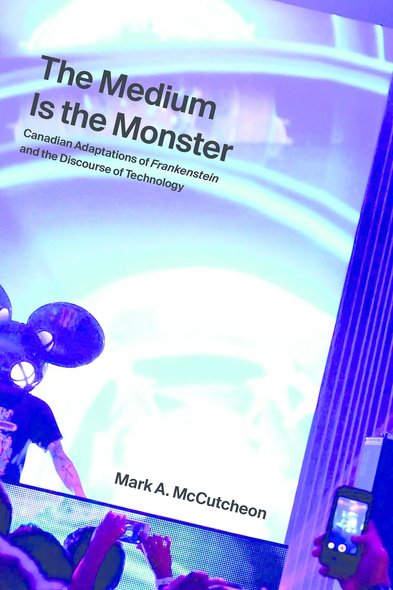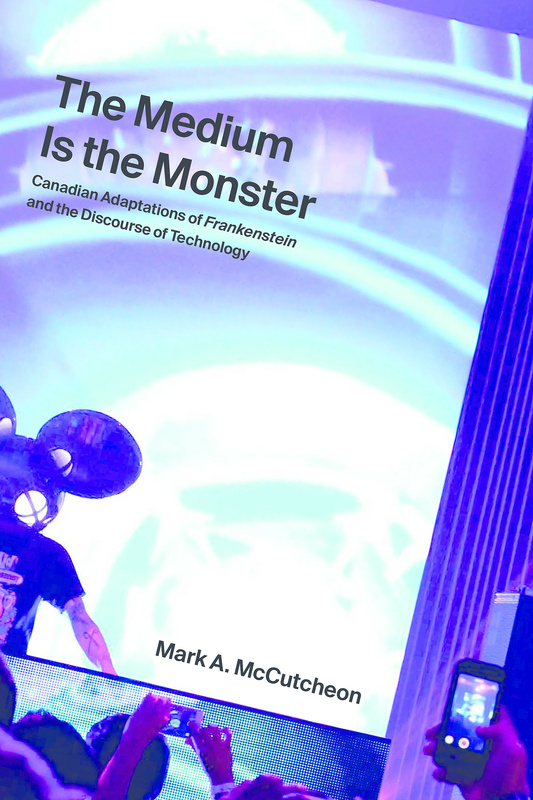Our shopping cart is currently down. To place an order, please contact our distributor, UTP Distribution, directly at utpbooks@utpress.utoronto.ca.

The Medium Is the Monster
Canadian Adaptations of Frankenstein and the Discourse of Technology
Technology, a word that emerged historically first to denote the study of any art or technique, has come, in modernity, to describe advanced machines, industrial systems, and media. McCutcheon argues that it is Mary Shelley’s 1818 novel Frankenstein that effectively reinvented the meaning of the word for modern English. It was then Marshall McLuhan’s media theory and its adaptations in Canadian popular culture that popularized, even globalized, a Frankensteinian sense of technology. The Medium Is the Monster shows how we cannot talk about technology – that human-made monstrosity – today without conjuring Frankenstein, thanks in large part to its Canadian adaptations by pop culture icons such as David Cronenberg, William Gibson, Margaret Atwood, and Deadmau5. In the unexpected connections illustrated by The Medium Is the Monster, McCutcheon brings a fresh approach to studying adaptations, popular culture, and technology.
McCutcheon offers an expert explication/application of McLuhan that contributes to the revival of interest in and understanding of the significance of his work. In his application of McLuhanesque thought to seminal Canadian science fiction texts and other cultural products, McCutcheon makes a valuable contribution to Canadian studies, especially in the areas of media, film, and genre studies. The Medium Is the Monster opens up new ways to read and understand figures about whom much has been written (Shelley, Gibson, and Cronenberg), while also bringing welcome attention to figures hitherto given less recognition than they merit.
From dance culture to scifi to Big Oil, Mark McCutcheon traces the McLuhanesque Frankenphemes of technological monstrosity—and their threat of future mischief—with an intensity that won't let you put this book down.
In this groundbreaking work, Mark McCutcheon wrestles with the question of what is distinctively Canadian about contemporary literary, cinematic, scholarly, and popular cultural adaptations of the Frankensteinian myth-eme. McCutcheon’s answer is seemingly simple at first glance: each of these adaptations/discourses bears the undeniable imprint of Marshall McLuhan’s influence. Yet that seemingly simple answer evolves, as the book proceeds into a detailed genealogy of these complex ‘Frankenphemes,’ always sensitive to the nuances of cultural production, which, in McCutcheon’s interpretation, often take an ‘ironic’ or ‘parodic’ turn, through Canada’s ambivalent cultural positioning. Ultimately, McCutcheon also argues for the diffusion of this McLuhanite interpretation of technology beyond Canadian borders to become a global and multifarious ‘figure of manufactured monstrosity.’ An erudite, compelling, and timely must-read for scholars of postcolonial theory, adaptation studies, and media, communication, literary, cinematic, and cultural studies.
Mark A. McCutcheon is an associate professor of literary studies at Athabasca University. His publications include articles on such subjects as Canadian popular culture, Frankenstein adaptations, and copyright policy in English Studies in Canada, Digital Studies/Le champ numérique, Continuum, Science Fiction Film & TV, and Popular Music, among other scholarly journals and books. Mark has also published poetry and short fiction in literary magazines like EVENT, Existere, Carousel, and subTerrain. Originally from Toronto, Mark lives in Edmonton. His scholarly blog is www.academicalism.wordpress.com and he’s on Twitter as @sonicfiction.




